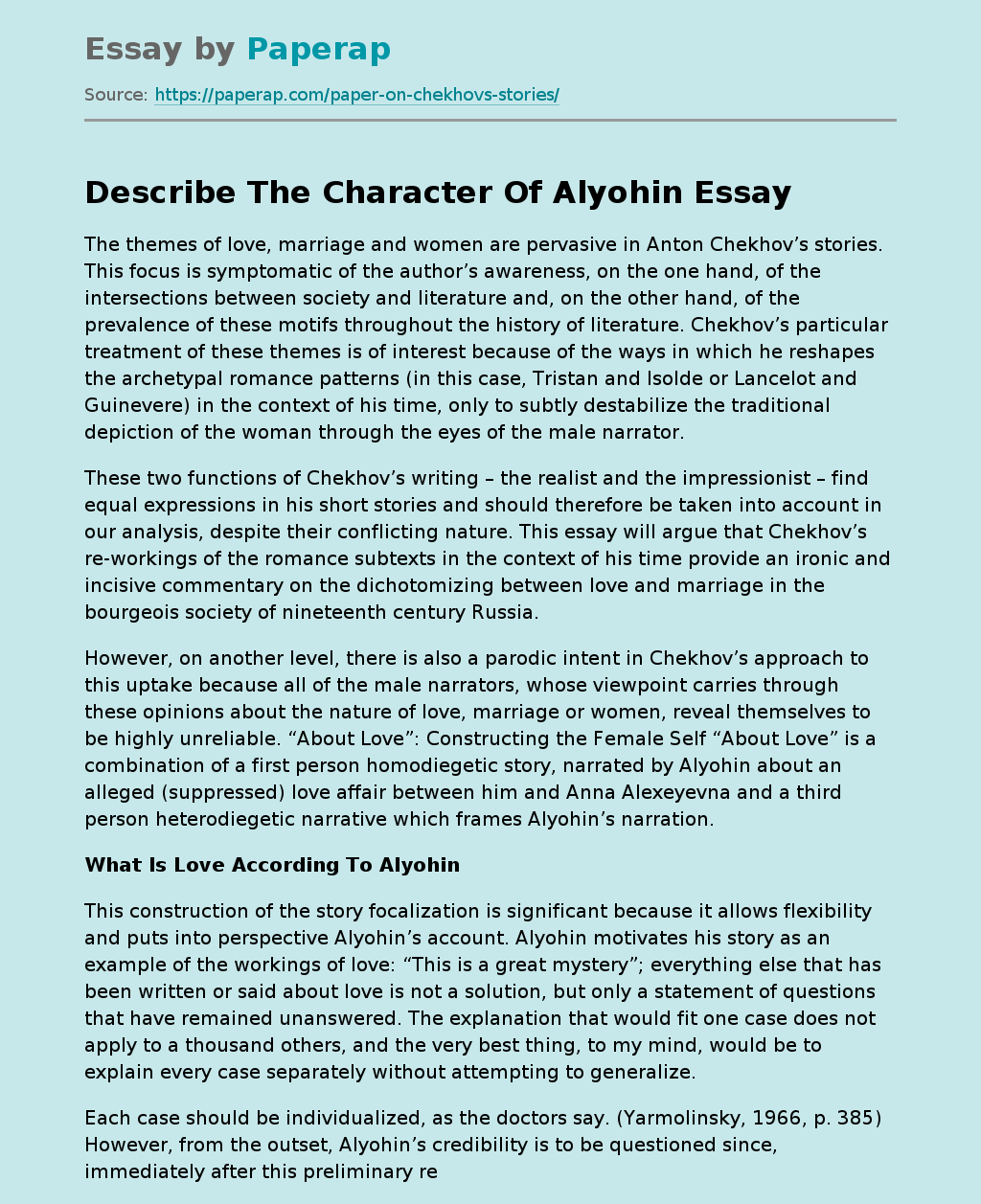Describe The Character Of Alyohin
The themes of love, marriage and women are pervasive in Anton Chekhov’s stories. This focus is symptomatic of the author’s awareness, on the one hand, of the intersections between society and literature and, on the other hand, of the prevalence of these motifs throughout the history of literature. Chekhov’s particular treatment of these themes is of interest because of the ways in which he reshapes the archetypal romance patterns (in this case, Tristan and Isolde or Lancelot and Guinevere) in the context of his time, only to subtly destabilize the traditional depiction of the woman through the eyes of the male narrator.
These two functions of Chekhov’s writing – the realist and the impressionist – find equal expressions in his short stories and should therefore be taken into account in our analysis, despite their conflicting nature. This essay will argue that Chekhov’s re-workings of the romance subtexts in the context of his time provide an ironic and incisive commentary on the dichotomizing between love and marriage in the bourgeois society of nineteenth century Russia.
However, on another level, there is also a parodic intent in Chekhov’s approach to this uptake because all of the male narrators, whose viewpoint carries through these opinions about the nature of love, marriage or women, reveal themselves to be highly unreliable. “About Love”: Constructing the Female Self “About Love” is a combination of a first person homodiegetic story, narrated by Alyohin about an alleged (suppressed) love affair between him and Anna Alexeyevna and a third person heterodiegetic narrative which frames Alyohin’s narration.
What Is Love According To Alyohin
This construction of the story focalization is significant because it allows flexibility and puts into perspective Alyohin’s account. Alyohin motivates his story as an example of the workings of love: “This is a great mystery”; everything else that has been written or said about love is not a solution, but only a statement of questions that have remained unanswered. The explanation that would fit one case does not apply to a thousand others, and the very best thing, to my mind, would be to explain every case separately without attempting to generalize.
Each case should be individualized, as the doctors say. (Yarmolinsky, 1966, p. 385) However, from the outset, Alyohin’s credibility is to be questioned since, immediately after this preliminary remark, he launches precisely in the generalizations he had just condemned: “We Russians who are cultivated have a weakness for these questions that remain unanswered. Love is usually poeticized, embellished with roses, nightingales […]” (p. 385). The contrast between the two statements is a deliberate device by which the reader is subtly warned not to rely completely on Alyohin’s perspectives.
As a story within a story, Alyohin’s account of his love for Anna Alexeyevna can therefore be interpreted as an imaginative construct in which the narrator’s uptake and rendition of the events and characters might not correspond to reality. In fact, Alyohin’s narrative is constructed in such a way as to deliberately undermine his viewpoint and question his understanding of the nature of women and love. Understanding the representation of women, love and marriage in this short story is hence problematic because, with only one exception, the image of the female character and of her marriage is entirely filtered through Alyohin’s eyes.
As John Freedman (1988) remarks: It is through this interplay of words between the true narrator and the character Alekhin that the ironic distance in the story looms large. Chekhov’s narrator allows the character to speak of a love that he believes to have existed (and which presumably did exist for him), while by carefully selecting Alekhin’s vocabulary and the scenes that he relates, Chekhov also allows his reader to arrive at a different interpretation of the affair (11). Indeed, Alyohin’s discourse is interspersed with demystifying devices that allow the reader to detect the gap between the events and the narrator’s re-construction.
There are several instances that Alyohin employs as “evidence” for Anna Alexeyevna’s love for him. The first one occurs upon their chance encounter at the theatre when Anna tells him: “You look listless. In spring, when you came to dinner, you seemed younger, livelier. You were animated, and talked a great deal then; you were very interesting, and I must confess I was a little carried away. For some reason I often thought of you during the summer, and this evening when I was getting ready to go to the theatre it occurred to me that I might see you” (389).
Describe The Character Of Alyohin. (2019, Dec 05). Retrieved from https://paperap.com/paper-on-chekhovs-stories/

